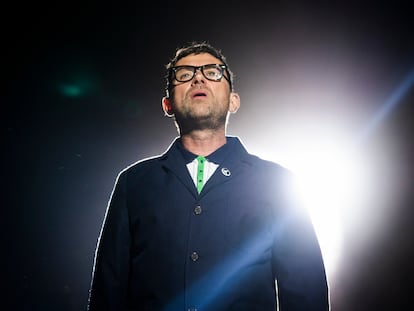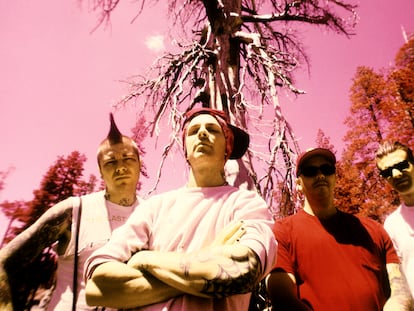The Kills didn’t break up. They were partying
After a six-year hiatus, the rock duo makes a comeback with ‘God Games,’ an album that explores gods, faith and the enduring power of music

Twenty years ago, they revitalized rock music by infusing it with a touch of aggression and refined intensity. Jamie “Hotel” Hince had been a member of bands with colorful names like Scarfo and the anarchical Blyth Power. Alison “VV” Mosshart made her mark in the punk band Discount. In 2000, the two crossed paths in London, where a 21-year-old Mosshart was touring with her group. A year later, they joined forces to form The Kills and released two albums that showcased their remarkable ferocity and uncompromising attitude: Keep On Your Mean Side (2003) and No Wow (2005).
Their fifth album, Ash & Ice (2016), appeared to be the last gasp of this transatlantic alliance. Mosshart, who once played with The Dead Weather, Jack White’s psychedelic garage band, was focusing on fashion, photography and painting. Hince was going through a divorce with model Kate Moss, recovering from a finger injury, and collaborating with diverse artists like rapper Azealia Banks.
The Kills reunited in 2022 for a concert in California and began working on their first original music in six years. They released 103, New York and LA Hex as singles in July 2023, and later included them on their sixth album, God Games. Released in October 2023, the album cover features a bullfighting scene. In February, The Kills will embark on a 30-concert tour in the United States.
The Kills are now in Europe to promote their new album. We met with them on the terrace of an art gallery in Lisbon’s Bairro Alto, on a morning that alternated between bright sunlight and drizzling rain. They arrived on time, but looked exhausted and not in the best mood. They asked to sit outside so they could smoke — each one burned through three cigarettes during our 30-minute conversation. Mosshart and Hince said they were willing to talk about anything, “except the pandemic and our private lives,” and after a muddled start, the interview gets underway.
Jamie starts off by sharing memories of going on tour in 1988, when “Europe was very different from today. It was just a few months before the [Berlin] wall fell, and East Berlin was still a dark and sordid city. It was like this underground wasteland where people were living as if they were constantly expecting a meteorite to come crashing down on them.” His earliest musical memories are intertwined with a nomadic childhood full of pop songs. “I remember when I was just three or four years old, belting out tunes with my sister as we cruised the roads of South Africa in our old van. My dad was a construction manager and we were always moving to new places.” He started his first band at age 12 with a classmate who played the piano in Woolton Hill, the English city where he grew up. “There wasn’t much else to do as an adolescent. If you weren’t into soccer or getting into fights, you just started a band. Sports, violence or music. We didn’t really know many other ways to feel like we were part of something.”
Mosshart avoided revisiting childhood memories. She says music has always been a big part of her life, but it took on a whole new level of intensity when she immersed herself in the vibrant punk scene of her hometown, Vero Beach, Florida. “We recorded our first album with Discount back in high school and then we went on tour that same summer. I didn’t even have time to think about what I wanted to do with my life. I just dove right in and let myself get carried away by the energy and the sense of freedom that making music with my friends gave me.”
Their paths crossed at the perfect moment. Hince was seeking fresh inspiration when he sensed his musical career was becoming stagnant. Mosshart, intrigued by the U.K. music scene, saw the older Hince as an ideal partner to introduce her to it. However, he was enough of an outsider to create rich, innovative music.
They launched a band together that became their main focus for “12 or 13 years.” After taking a break, The Kills are now making a comeback, perhaps stronger than ever. Reflecting on their journey, they believe they have created a legacy of “good songs, solid albums and an occasionally magnificent concert.” Hince says they never thought The Kills were dead and gone. “When you look at it from the outside, you might think that — after a hiatus of more than six years between albums — we dissolved the group without announcing it. But that was never what we thought.”
“We just do other things,” Mosshart adds. “But we’ve never lost touch and we’ve been sharing ideas and musical projects all along. Some of them just took forever to come together, like God Games.” Does it make sense to release an album in the Spotify era, where attention deficit and instant consumption is the norm? Jamie is sure that it does. “Those who insist that albums are a thing of the past don’t consider that the industry still follows the same production and consumption logic as it did 20, 30 or 40 years ago. The singles and tours serve their purpose, but it’s the albums that really matter. Without them, there would be no singles, no concerts and no promotional interviews. In fact, you wouldn’t have asked me if The Kills ever broke up if there hadn’t been a six-year break between our fifth and sixth albums. It’s the albums that put you on the map and make you exist. Technology may have changed how we listen to music, but the way it’s created, produced and marketed remains the same.”
Mosshart jumps in to say that God Games is “a snapshot of a new life stage that Jamie and I have shared and turned into songs.” It’s a “very energetic, very urban” album, but still as “minimalist” as always. The 2023 version of The Kills is both different and “essentially the same” as The Kills in 2003 and 2016. “The Kills are us — Jamie and me. We’re burning through life stages together and recording — step by step — the evolution of our lives and careers.” For Hince, “releasing an album is like spending two or three years holed up in your studio, painting away. And when the time comes, it’s like setting up an exhibition and showing your art to the world. Some artists, especially the young ones, can sell their work directly on Instagram without needing to exhibit it. But for us, we still crave that exhibition. Call us perverse or old-fashioned, but that’s just how we are.”
And, yes, the album has a concept. It’s about gods, idols and “beliefs that attempt to assign transcendent meaning to a life that might not actually have any.” It’s also about that secular idolatry of rock music, daily rituals and superstitions. How random chance turns people into helpless puppets. Hince and Mosshart define themselves as “a couple of atheists full of faith and who refuse to abandon it.” They believe in The Kills, the flower they created together that is now “in full bloom” in its third decade. They believe in “the power of music and the communities around it.” According to Mosshart and Hince, music is a matter of faith. As they finish their last cigarettes, they somewhat sarcastically recommend listening “with affection” to the twelve songs that make up God Games. “If your theory about albums proves out, it might just be the last one of our career. And that would be such a shame, because we’re actually in a good place and we still have so much music to offer.”
Sign up for our weekly newsletter to get more English-language news coverage from EL PAÍS USA Edition










































